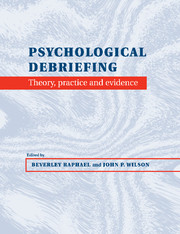Book contents
- Frontmatter
- Contents
- List of contributors
- Introduction and overview: Key issues in the conceptualization of debriefing
- Part I Key conceptual framework of debriefing
- Part II Debriefing: models, research and practice
- Part III Adaptations of debriefing models
- Part IV Debriefing overview and future directions
- 22 Concerns about debriefing: challenging the mainstream
- 23 Is consensus about debriefing possible?
- 24 Can debriefing work? Critical appraisal of theories of interventions and outcomes, with directions for future research
- 25 A conceptual framework for mass trauma: implications for adaptation, intervention and debriefing
- Conclusion: debriefing – science, belief and wisdom
- Index
23 - Is consensus about debriefing possible?
from Part IV - Debriefing overview and future directions
Published online by Cambridge University Press: 06 January 2010
- Frontmatter
- Contents
- List of contributors
- Introduction and overview: Key issues in the conceptualization of debriefing
- Part I Key conceptual framework of debriefing
- Part II Debriefing: models, research and practice
- Part III Adaptations of debriefing models
- Part IV Debriefing overview and future directions
- 22 Concerns about debriefing: challenging the mainstream
- 23 Is consensus about debriefing possible?
- 24 Can debriefing work? Critical appraisal of theories of interventions and outcomes, with directions for future research
- 25 A conceptual framework for mass trauma: implications for adaptation, intervention and debriefing
- Conclusion: debriefing – science, belief and wisdom
- Index
Summary
EDITORIAL COMMENTS
This chapter is a brief presentation of an attempt to attain consensus on some key questions in the field of debriefing, derived from a consensus conference held in 1996 in Australia. What becomes very clear is that even with those supportive of debriefing and those critical of it working together personally, there was extreme difficulty in gaining agreement on common issues. The result might be suggested to be a general and perhaps polite recognition of the other points of view, but nevertheless a strong commitment to the original respective beliefs.
While this specific consensus meeting was held some years ago the themes of difficulty in reaching agreement are reflected in more recent debates and in this book. The same proponents are profoundly committed, despite a growing body of scientific evidence questioning benefits. The International Society for Traumatic Stress Studies has also recently addressed the need for a stronger evidence base and is developing Evidence Based Guidelines. Nevertheless, the belief that something must be done and the need to give this a structure make it difficult to challenge the commitment to debriefing. Thus moving to a consensus continues to be difficult.
This book shows that there has been some movement, particularly in the fields of establishing a stronger scientific base for both points of view. Nevertheless, the widespread and often uncritical usage of debriefing models by those who may have little training and experience with respect to the situations in which they apply their techniques must call for major concern – first, do no harm.
Keywords
- Type
- Chapter
- Information
- Psychological DebriefingTheory, Practice and Evidence, pp. 321 - 326Publisher: Cambridge University PressPrint publication year: 2000
- 2
- Cited by

